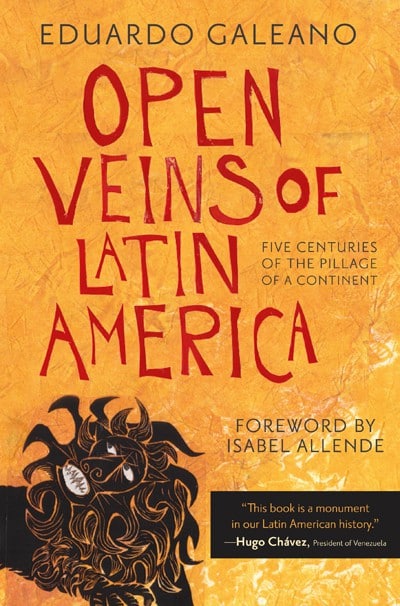
"In 1492, the natives discovered that they were Indians, that they lived in America, that they were naked, that sin existed, that owed obedience to a king and queen who lived in another world and to a God who lived in another sky and that that God had invented guilt and clothes and had ordered to be burned alive anyone who adored the sun and the moon and the earth and the rain."
Reflection On Columbus: Happy To Be An American; Pissed At The Process
Five Centuries of the Pillage of a Continent

Paperback, 360 pages
ISBN: 0-85345-991-6
ISBN-13: 978-0-85345-991-0
Released: 1997
Also available as an e-book
ISBN: 0-85345-991-6
ISBN-13: 978-0-85345-991-0
Released: 1997
Also available as an e-book
25th Anniversary Edition
Translated by Cedric Belfrage
New Introduction by Isabel Allende
Since its U.S. debut a quarter-century ago, this brilliant text has set a new standard for historical scholarship of Latin America. It is also an outstanding political economy, a social and cultural narrative of the highest quality, and perhaps the finest description of primitive capital accumulation since Marx. Rather than chronology, geography, or political successions, Eduardo Galeano has organized the various facets of Latin American history according to the patterns of five centuries of exploitation. Thus he is concerned with gold and silver, cacao and cotton, rubber and coffee, fruit, hides and wool, petroleum, iron, nickel, manganese, copper, aluminum ore, nitrates, and tin. These are the veins which he traces through the body of the entire continent, up to the Rio Grande and throughout the Caribbean, and all the way to their open ends where they empty into the coffers of wealth in the United States and Europe. Weaving fact and imagery into a rich tapestry, Galeano fuses scientific analysis with the passions of a plundered and suffering people. An immense gathering of materials is framed with a vigorous style that never falters in its command of themes. All readers interested in great historical, economic, political, and social writing will find a singular analytical achievement, and an overwhelming narrative that makes history speak, unforgettably. This classic is now further honored by Isabel Allende’s inspiring introduction. Universally recognized as one of the most important writers of our time, Allende once again contributes her talents to literature, to political principles, and to enlightenment.

To publish Eduardo Galeano is to publish the enemy: the enemy of lies, indifference, above all of forgetfulness. Thanks to him our crimes will be remembered. His tenderness is devastating, his truthfulness, furious.
This book is a monument in our Latin American history. It allows us to learn history, and we have to build on this history.
A superbly written, excellently translated, and powerfully persuasive expose which all students of Latin American and U.S. history must read.
I cannot recommend this book highly enough. Galeano’s vision is unswerving, surgical and yet immensely generous and humane. This book, written more than thirty years ago, contains profound lessons for contemporary India. Eduardo Galeano ought to be a household name in this country.
No comments:
Post a Comment